25 Practical Tips to Beat Insomnia Tonight [Updated 2019]
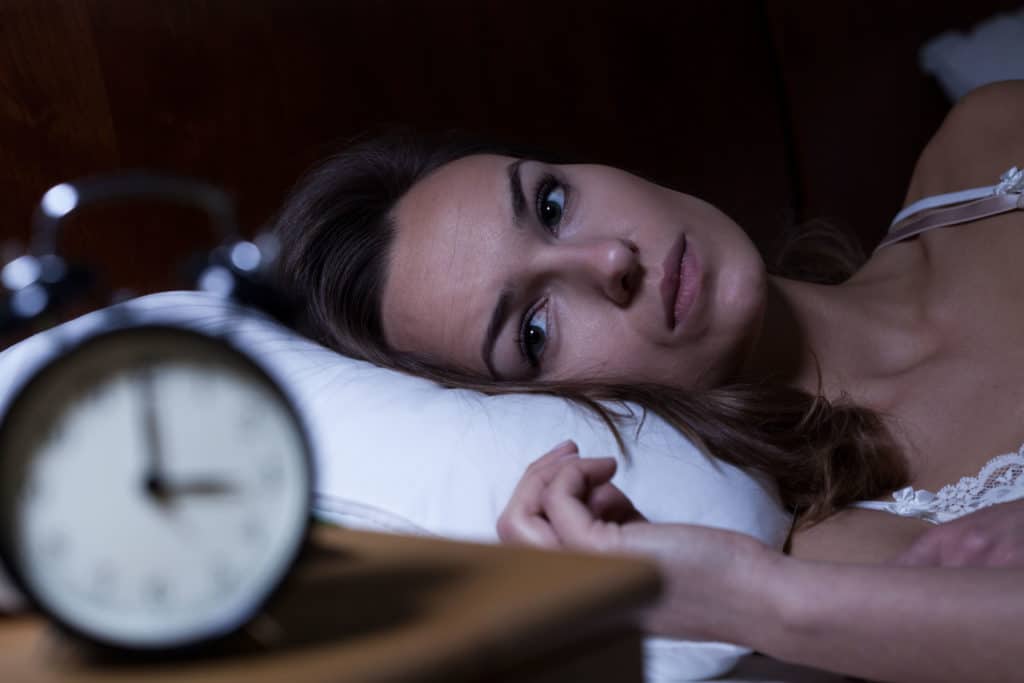
We Need More Sleep
I think you’ll agree. We all want better sleep.
But so many of us struggle with insomnia.
It seems to be a modern day curse.
Well it turns out that you can dramatically improve your chance of getting a good sleep by following these tips.. Many have been tested in university settings and have proven results.
What I’m going to do in this post is tell you exactly how you can use these 23 proven methods to improve your chance of sleep and beat insomnia.
Important Note: If you have chronic insomnia and it is affecting your health, you should see your family doctor for more help.
Here's a Harvard Medical School (Harvard Health Publishing) quote:
"Some studies suggest a link between exposure to light at night, such as working the night shift, to some types of cancer, diabetes, heart disease, and obesity.
That's not proof that nighttime light exposure causes these conditions; nor is it clear why it could be bad for us.
But we do know that exposure to light suppresses the secretion of melatonin, a hormone that influences circadian rhythms, and there's some experimental evidence (it's very preliminary) that lower melatonin levels might explain the association with cancer."
Find the link here
So let’s jump straight into the detail of these 25 tips to get a great sleep.
No time to read it all?
Click here to go straight to the list of our 25 best insomnia hacks.
1. Yoga, not just for Hipsters anymore
Yoga used to be the sole domain of people from the sub-continent of Asia and Hippies or Hipsters in western countries.
Not anymore!
These days big muscly fellas in football teams are employing yoga as both a method for relaxation or to help build core strength and balance.
There are different types of yoga though, some are quite intense and help build both improvements in cardio and strength, whereas others are much more soothing and get you ready for bed.
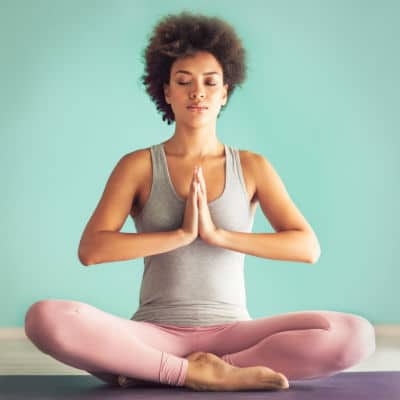
I was part of a group doing yoga a few years ago and every single time that our yogi would get to the relaxation part at the end, I would be drifting off to sleep, along with several of the other participants.
In fact we used to joke that we needed to employ our yogi to stand next to our beds and calmly soothe us into slumber.
So, you’ve got nothing to lose but the bags under your eyes!
I recommend finding a good yogi at first, but once you get the hang of it you can do it yourself just before going to bed.
Make sure you checkout the reviews online and choose a yogi that people have found very relaxing.
2. Listen to relaxing music.

This one has good quality science behind it.
Many scientific studies have demonstrated that listening to soothing music before bed time: shortens the time to get to sleep; improves the quality of sleep; and reduces waking during the night.
The intervention (soothing music) exhibited beneficial effects on sleep quality in adults with insomnia. (Huang et. al. 2016)
They also found that most people preferred to listen to soothing music over other interventions such as going for a brisk walk.
So get out your head phones, put on your favourite soothing music (Enya, Metallica or whatever floats your boat really!) and spend some time winding down to get ready for a great sleep.
Combining this with one or more of the other tips below may have an even greater effect!
3. Try an Insomnia App
Many insomnia help applications (Apps) are now available on both the Android and Apple platforms.
Website Healthline have complied a list of the apps that they found to be the most effective in improving insomniac’s sleep patterns. You can read it here.
Some of the apps simply provide music which is soothing and conducive to sleep.
Some of the better ones will actually track your sleep patterns and give you feedback on how well or otherwise you are sleeping, and then give you advice on things you can do around sleep hygiene to make sure you get better quality sleep.
One of the strengths of these apps is that they will give you help each day so that you are more likely to actually change the way you approach your sleep time.
Like many things they are only helpful if you follow through with them.
4. Keep a sleep diary
This is a popular technique used by sleep health professionals in getting to the bottom of the severity of insomnia.
What many people find is that their insomnia may not be as severe as they first thought.
This will therefore reduce the stress around trying to get to sleep.
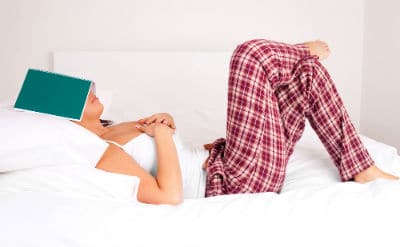
So what you do every day is to right down when you were able to get to sleep and when you woke up.
Do this for a period of several weeks and then add up the amount of hours sleep you are getting on an average night.
You may also notice some patterns emerging with your good night’s sleep and your poor sleep.
This can help you to refine the activities, food and drink and other strategies like meditation that may be conducive to a good sleep.
And if it turns out that it is as bad as you thought, you can always move on to hack number 3!
5. Get out of bed at the same time everyday, no matter how tired you might be.

This helps reset the circadian rhythms – the internal clock that tell your body when it should be going to sleep and when you should be getting up each day.
Circadian rhythms can be upset by many things including stimulants like caffeine, too much screen time and exercise.
So, if you need to wake up early on week days to make sure you get to work on time, make sure you get up at that time on the weekends too.
Don’t sleep in just because you have the opportunity to.
You may think that you are catching up on missed sleep, when what you are really doing is screwing up your internal body clock.
6. Stay up Later
Similar to the previous hack, this can help circadian rhythms to get back to normal.
It should also of course make you more tired and ready to go to sleep.
This can improve your sleep efficiency as you are not giving your body as much time to sleep, thereby forcing it to be more efficient.
This will not work for everyone so if you are really tired at your normal bedtime, then that’s when you should go to bed.
But if you find you’re at 10pm and wide awake, it may be best to stay up for a while doing something relaxing to wind yourself down.
This way you may avoid lying in bed for a couple of hours with your mind whirring round and around.
7. Morning Sunlight
Get some sunlight first thing in the morning.
Melatonin is a hormone created by the pineal gland during night time to help us sleep.
It’s production is turned off as soon as the eyes see sunlight.

So if the day is sunny, get outside shortly after getting up to let your body know that it’s time to get up, and then in the evening when it gets dark your body is more likely to detect the difference and get ready for sleep.
This is another one of those tricks that helps reset the circadian rhythms so that your body knows when to be awake and when it’s time for sleep.
8. Give yourself a break!
As mentioned earlier, worrying about not getting enough sleep is one of the biggest contributing factors to insomnia.
Many of us agonise over the fact that we aren’t sleeping to the point that actually prevents us from calming down and getting some sleep.
I’m sure I’m not alone in lying in bed thinking, “I’ve got to get to sleep, I’ve got to get to sleep! Big day tomorrow, oh no!”
So when you find you’re not getting to sleep, break it up by getting up for a little while, and reading a book or meditating and getting your brain into a sleepy state.
9. Valerian Root

Many people including myself have had great success with this one.
Valerian is a herb and is not habit forming like some of the prescription medications for insomnia.
We’re all about the science here, and for Valerian the results have been mixed.
Some good quality studies suggested that Valerian helped in the treatment of insomnia, whilst other good quality studies suggested that it does not.
So, really then it’s up to you to give it a go!
If you are on any medications or have medical conditions, be sure to consult with your family doctor before trying Valerian.
If like me you feel it helps treat your insomnia, then you can add it to your armoury.
If not, then we’ve got a heap of other things you can try!
10. Don’t nap during the day!
Quite a logical one really.
But one that I can be so tempting when we get a bit of a break from our hectic lives, or when we’re on holidays and the opportunity for an extra bit of sleep are available to us.
If our bodies thinks they’re going to get a nice dose of sleep in the afternoon, why would they bother too much with sleep at night?
This is yet another habit which plays havoc with our circadian rhythms.
11. Limit Screen time
Many studies have shown a correlation between increased screen time and reduced sleep duration and quality.
"less sleep and reduced sleep efficiency were each statistically significantly associated with longer average screen-time"
(Christensen et. al. 2016) Tweet
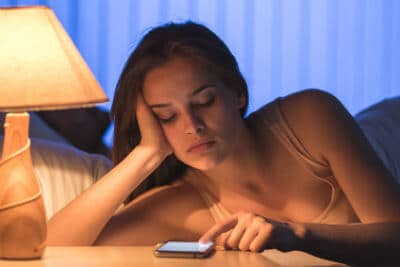
Our phones, tablets and computer screens emit blue light, which is different to the white light emitted by the sun.
Blue light is environmentally more friendly as it uses less power, and is great for keeping us alert whilst we work.
But, it has a negative effect on our ability to get to sleep.
So, hard as it may be, put away that phone, tablet or PC an hour before bed.
12. Put Your Thoughts to Bed
This hack is particularly effective for those of us who have so much going on in our heads that we can’t switch off at night.
If you work with your partner, set a rule that you don’t talk about work in the 2 hours or so before bedtime. And if something really is that important, write it down so that you can ask them in the morning
Jotting down your concerns can help to put them to bed before you put yourself to bed.
No one seems to know why it works but it has become a very popular tool for some of the most successful people on the planet.
13. Don’t exercise in the 4 hours leading up to bedtime.

This is one that we did a blog post on earlier – “Exercise and Sleep, is it beneficial?” Read Here
Many of us have believed for a long time that exercise will help us to sleep better, and that is still true.
But what is of great importance is what type of exercise and what time of day you should exercise.
Vigorous and continuous exercise is considered to be the best for improving sleep.
This includes, running, walking, cycling and swimming.
Whilst lifting heavy weights, sprinting and other anaerobic (non oxygen demand) exercises may not help.
In turn performing vigorous exercise increases your body temperature and it is recommended that you give yourself 4 hours for your body to cool down.
14. Avoid caffeine in the hours before going to sleep.
Most of us will know that coffee is a caffeinated drink which can keep us up at night.
But many people don’t realise that the following are also culprits:
- hot or cold chocolate drinks
- Tea
- Cola flavoured sodas or soft drinks whether sugar or sugar-free
- Milk chocolate
- Dark chocolate
- Energy drinks
- Guarana – about twice as much caffeine per milligram as coffee!

Surprisingly studies have found that caffeine has a negative effect on our sleep even when consumed 6 hours before going to bed!
They have therefore recommended 2p.m. as the cut off time for food or drinks containing caffeine. Quite a shock to me!
15. Avoid alcohol and cigarettes.
Whilst many people associate drinking alcohol with sleepiness, it may not produce good quality sleep.
Whilst it can allow you to fall asleep quite quickly, it adversely affects the continuity of your sleep, causing you to frequently wake up during the night.
This means that you have less REM sleep, the important restorative part of sleep.
Whilst cigarettes and other tobacco products can interrupt sleep due to nicotine being a strong stimulant.
Another cause of sleep disruption for regular smokers can be withdrawal as your body craves the fix of nicotine during the night.
16. Carbs Before Bedtime
Researchers from Sydney, Australia studied the effects of different foods, eaten at different times by young healthy men before bed.
They found that carbohydrates with a high glycemic index like Jasmine rice, eaten 4 hours before bed, was the most beneficial.
This combination was best for both sleep quality and time to fall asleep.
To find out more about which foods help to promote sleep and which ones don’t read our Sleep Foods Blog by clicking here,
17. Only the two ’S’ words in the bedroom!
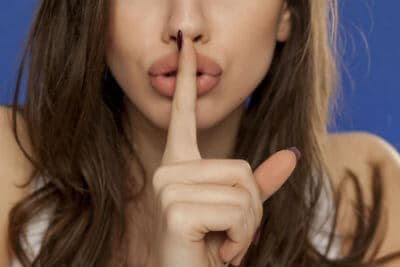
Yes, the one you’ve been waiting for!
The only two activities you should save for the bedroom are sleeping, and sex.
Watching TV, reading, looking at social media on your phone or computer and pretty much anything else you can think of should be conducted somewhere else.
Creating a bedroom environment free of clutter and distractions can help your mind to know that once you are in bed, you’re there for one of two things.
Plus, a healthy sex life has also been shown to improve sleep quality,
To find out more read our blog on Creating the Perfect Sleep Environment by clicking here.
18. Meditate or other relaxing activity before bedtime.
Meditation has been catching on like wildfire over the past few years.
Many successful people as well as many of the rest of us have found great benefits from mediation.
From Ellen DeGeneres to Arnold Schwarzenegger, from Katy Perry to Jerry Seinfeld and Clint Eastwood.
All of these famously successful people have stated publicly that meditation helped them get through stressful times and achieve a certain amount of calm amid the storms swirling around them.
If it’s good enough for those people and many others around the world, it’s certainly good enough for me.
Maybe the habits of these stars may help you to achieve better restorative sleep.
Meditation can be as simple as sitting somewhere quiet, closing your eyes, and focussing on your breath as it passes in and out of your body.

One of the tricks I was taught which helped my meditation greatly was not to fight thoughts that will inevitably float into your mind.
It is natural for things that are going on in your life to come into your mind when you try to relax.
The best thing to do with these thoughts is to acknowledge them, and then to refocus on your breathing.
One of my popular tools is to imagine those thoughts getting onto a bus and taking off into the distance.
Mindworks has some great blog posts on how to get started with mindfulness and meditation here.
19. Try a Heavy Blanket
People who’ve used a heavy blanket describe it as feeling like they are getting a hug.
This tool is particularly popular with those of us who suffer from anxiety or chronic pain.
These blankets can contribute to less movement during the night which may help us achieve deeper sleep quickly.
Weighted garments and blankets have been used for years by occupational therapists for children with sensory processing issues.
They help these children to get more sensory feedback and therefore have a better feeling of “where they are in space.”
It has been suggested that these blankets will tend to work well for people who respond well to touch, such as massage or other physical therapies.
Whereas people who don’t like to be touched by other people, may find that the blankets are not helpful and may actually increase their anxiety and reduce their sleep.
Around 10% of your own weight is a common recommended weight for your blanket.
Weighted blankets can be ordered through https://www.calmingblankets.com.au and https://theweightedblanketco.com among others (Rate Hotel Beds does not derive a benefit from either company).
20. Don't Watch the Clock!
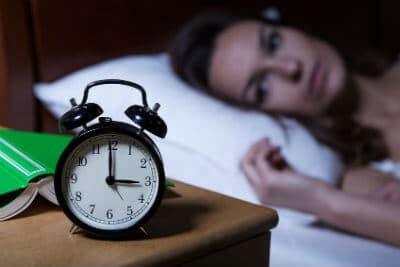
This one really feeds our anxiety.
I’ve been guilty many times of thinking, “Ahh it’s 2am and I’m still not asleep! I’ve got to get up at 6!”
So to try and reduce the anxiety around insomnia, turn your bedside clock around, you’ll still hear the alarm.
Morning is going to come whether you like it or not, so you might as well try to relax, and sleep may follow.
21. Only go to bed when you feel sleepy.
Seems like an obvious one, but not always.
Not only will it take you longer to get to sleep if you’re not ready, but it will also increase your frustration and anxiety around insomnia, only compounding the problem.
22. If you can’t get to sleep, get up.
As for the number 13, if you lie in bed unable to get to sleep it will only compound the problem.
Experts recommend that we don’t let it frustrate us, but instead get up and read or some other quiet activity until we feel sleepy enough to have another try.
23. Ensure ideal room temperature.
Many of us go over the top when it comes to keeping warm.
Too many blankets or a thick duvet (doona or quilt) plus having the room heating on too high can cause us to wake up through the night or toss and turn.
It can also cause us have to wake up to remove some of the bed clothing or turn the heating down.
On the other hand being too cold can of course make it very difficult to get to sleep in the first place.
24. Create a peaceful environment in your bedroom.
Make sure that loud noises are not going to disrupt you from sleep.
If you live in a noisy area or have noisy neighbours then a pair of earplugs may be helpful.
**Important: Make sure you are still able to hear any smoke or fire alarms that are installed as this far outweighs any other considerations.
To read more check out our blog on Creating a Perfect Sleep Environment here.
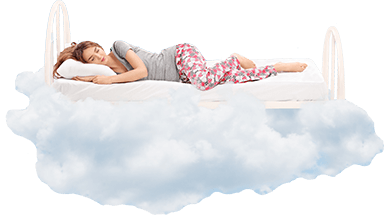
25. Ensure you are comfortable.
Apart from the very young, no one finds it easy to go to sleep on a rock.
This doesn’t always mean that you need to spend big dollars on the latest and greatest in bedding technology.
Sometimes ensuring you have the correct pillow height, or the correct density of your mattress can be enough to ensure you a much better sleep.
For more on the ideal mattress and pillow combination for side-sleepers check our earlier blog here.
A roundup of all our 23 sleep hacks:
- Yoga, not just for Hipsters anymore.
- Listen to relaxing music.
- Try an Insomnia App
- Keep a sleep diary
- Get out of bed at the same time everyday, no matter how tired you might be.
- Stay up later
- Morning Sunlight
- Give yourself a break! (Don’t obsess about not getting enough sleep)
- Valerian Root
- Limit Screen Time
- Don’t nap during the day!
- Avoid caffeine in the hours before going to sleep.
- Avoid alcohol and cigarettes.
- Don’t exercise in the 4 hours leading up to bedtime.
- Put Your Thoughts to Bed
- Eat Carbs Before Bed Time
- Only the two ’S’ words in the bedroom! (Yes that’s sleep and sex!)
- Meditate or other relaxing activity before bedtime.
- Try a Heavy Blanket
- Don’t watch the clock.
- Only go to bed when you feel sleepy.
- If you can’t get to sleep, get up.
- Ensure ideal room temperature.
- Create a peaceful environment in your bedroom.
- Ensure you are comfortable.
Conclusion
So which one are you going to try first?
Leave a comment to let us know which tool you used and if it helped you to get better sleep.
Often even just one or two of these hacks will help you to greatly improve your sleep time and quality.
It could be as easy as taking that cell phone out of the bedroom or knocking back that third cup of coffee between you and a great sleep.
You probably don’t need to be told how much impact can be made on your work and social life by ensuring you get an extra hour or two of good quality sleep.
We must reiterate that we’re not suggesting these tips are insomnia cures, if you are suffering from chronic insomnia, we strongly recommend you consult your family doctor or sleep specialist.
Join Us!
Let us know in the comments below if you have any other great sleep hacks that people can add to this list!
We’d love to have you join our community and start reviewing hotel mattresses that you’ve slept on!
